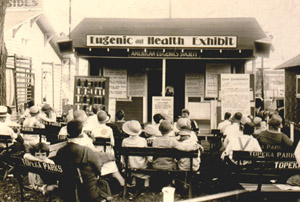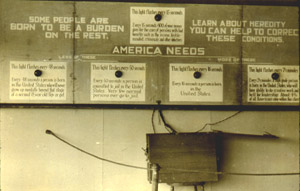 In pursuit of their social agenda, the eugenics movement adopted two faces, a "positive" one, which concentrated on exhorting the genetically gifted to reproduce, and a "negative" one, which sought to prevent the defective from breeding. From 1900 on, the movement found a receptive ear in state legislatures, as it did in Washington, and it exerted a profound influence on American public policy. By the 1930s, most states had passed eugenical laws authorizing the sterilization of "defectives," and in an infamous decision, the U.S. Supreme Court agreed such laws were constitutional. Eugenical lobbying also contributed to the powerful anti-immigration movement of the 1910s and 1920s, using their scientific studies to support the claim that non-whites and immigrants were inferior to native-born white Americans in intelligence, physical condition, and moral stature. Even though the meticulous studies of Franz Boas, H.S. Jennings, and others amply demonstrated the failure of eugenical methodology and the falsity of their claims, the eugenical tide continued to swell. Only after the Second World War, when the horrific results of the Nazi eugenic program became fully evident, did the movement lose steam. Though much smaller in scope, it continues today.
In pursuit of their social agenda, the eugenics movement adopted two faces, a "positive" one, which concentrated on exhorting the genetically gifted to reproduce, and a "negative" one, which sought to prevent the defective from breeding. From 1900 on, the movement found a receptive ear in state legislatures, as it did in Washington, and it exerted a profound influence on American public policy. By the 1930s, most states had passed eugenical laws authorizing the sterilization of "defectives," and in an infamous decision, the U.S. Supreme Court agreed such laws were constitutional. Eugenical lobbying also contributed to the powerful anti-immigration movement of the 1910s and 1920s, using their scientific studies to support the claim that non-whites and immigrants were inferior to native-born white Americans in intelligence, physical condition, and moral stature. Even though the meticulous studies of Franz Boas, H.S. Jennings, and others amply demonstrated the failure of eugenical methodology and the falsity of their claims, the eugenical tide continued to swell. Only after the Second World War, when the horrific results of the Nazi eugenic program became fully evident, did the movement lose steam. Though much smaller in scope, it continues today.
The American Eugenics Society was founded in 1926 by Harry Crampton, Harry H. Laughlin, Madison Grant, and Henry Fairfield Osborn with the express purpose of spearheading the eugenical movement. With a peak membership of around 1,250 in 1930, the AES worked at both the scientific and popular levels, becoming a highly effective organization at disseminating practical and scientific information on genetic health, drawing attention to eugenics, and promoting eugenical research.
 At state and local fairs during the 1920s and 1930s, the AES sponsored lectures and exhibits intended to demonstrate principles of heredity and the menace of unchecked breeding among the unfit (above right). "Some people are born to be a burden to the rest," read one sign prominently displayed in the Society's "flashing light exhibit" (left). On this panel, four red lights were set to flash at various intervals, driving home the point of the text. While a new child is born in America every 16 seconds, it claimed, every 48 seconds a feeble-minded child is born, every 50 seconds comes a criminal ("Very few normal persons ever go to jail"), but only every seven and a half minutes is a truly creative and capable person born. As for the pocketbook, every 15 seconds, $100 of each taxpayer's money goes to support the mentally and morally defective. The threat to American society, according to eugencists, was clear: the dangerous and defective were reproducing too quickly, while the normal and advantaged of this nation reproduced too little.
At state and local fairs during the 1920s and 1930s, the AES sponsored lectures and exhibits intended to demonstrate principles of heredity and the menace of unchecked breeding among the unfit (above right). "Some people are born to be a burden to the rest," read one sign prominently displayed in the Society's "flashing light exhibit" (left). On this panel, four red lights were set to flash at various intervals, driving home the point of the text. While a new child is born in America every 16 seconds, it claimed, every 48 seconds a feeble-minded child is born, every 50 seconds comes a criminal ("Very few normal persons ever go to jail"), but only every seven and a half minutes is a truly creative and capable person born. As for the pocketbook, every 15 seconds, $100 of each taxpayer's money goes to support the mentally and morally defective. The threat to American society, according to eugencists, was clear: the dangerous and defective were reproducing too quickly, while the normal and advantaged of this nation reproduced too little.
 The message of eugenics was delivered in more subtle ways that appealed directly to "normal" Americans. The AES sponsored "Fitter Family" contests, open to all who chose to participate, using measures of physical appearance, health, behavior, and intelligence to judge which family displayed the greatest potential to produce genetically superior children. Divided into small, medium, and large family categories, as well as couples, the contests were enormously popular. The family at right won the large family class at the Texas State Fair in 1925.
The message of eugenics was delivered in more subtle ways that appealed directly to "normal" Americans. The AES sponsored "Fitter Family" contests, open to all who chose to participate, using measures of physical appearance, health, behavior, and intelligence to judge which family displayed the greatest potential to produce genetically superior children. Divided into small, medium, and large family categories, as well as couples, the contests were enormously popular. The family at right won the large family class at the Texas State Fair in 1925.
The scrapbook of the American Eugenics Society contains nearly 100 photographs that document the society's efforts to popularize their science. From photographs of AES officers to instructional images of guinea pigs, to views of AES exhibits at state fairs and other popular venues, the album documents why and how the movement became as popular and powerful as it did. It is an integral part of the library's famous holdings for the history of evolutionary biology, genetics, and eugenics.
